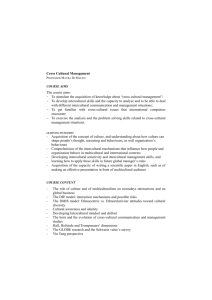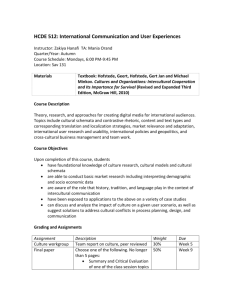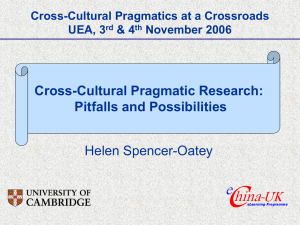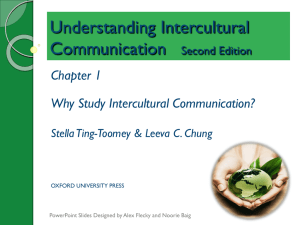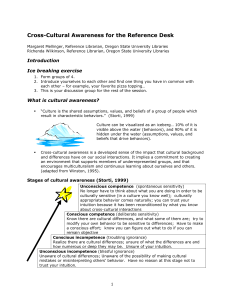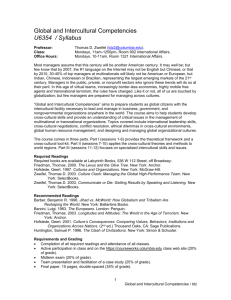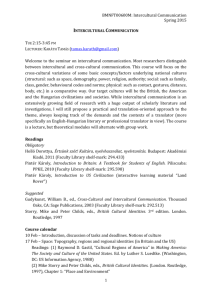Cross Cultural Management
advertisement
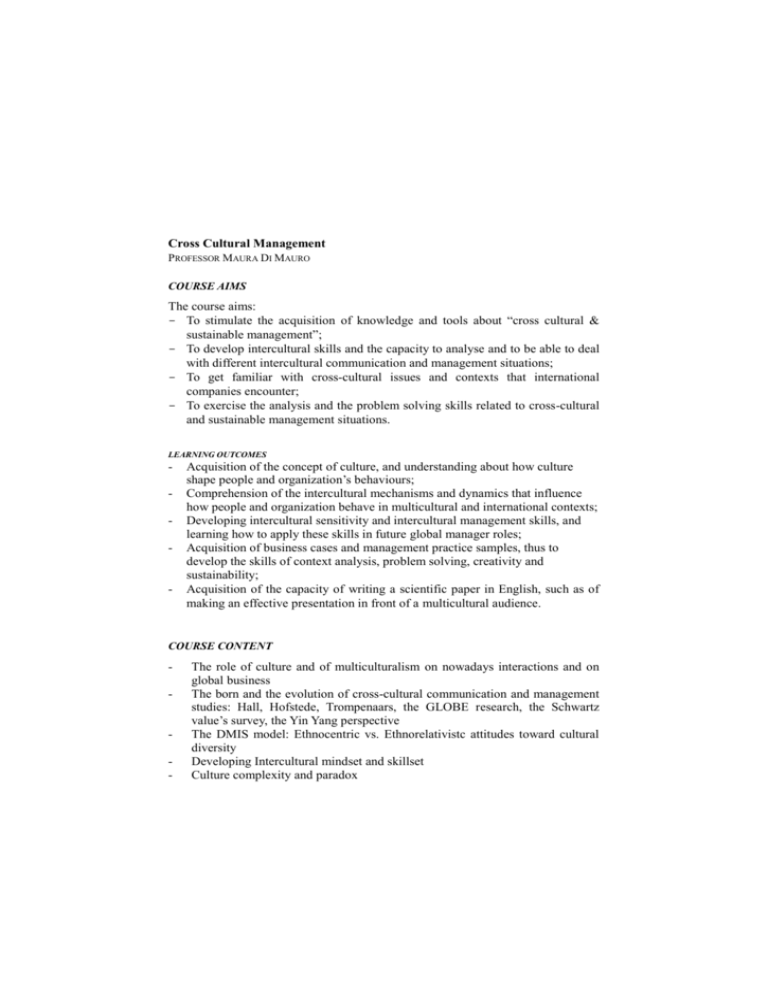
Cross Cultural Management PROFESSOR MAURA DI MAURO COURSE AIMS The course aims: - To stimulate the acquisition of knowledge and tools about “cross cultural & sustainable management”; - To develop intercultural skills and the capacity to analyse and to be able to deal with different intercultural communication and management situations; - To get familiar with cross-cultural issues and contexts that international companies encounter; - To exercise the analysis and the problem solving skills related to cross-cultural and sustainable management situations. LEARNING OUTCOMES - Acquisition of the concept of culture, and understanding about how culture shape people and organization’s behaviours; Comprehension of the intercultural mechanisms and dynamics that influence how people and organization behave in multicultural and international contexts; Developing intercultural sensitivity and intercultural management skills, and learning how to apply these skills in future global manager roles; Acquisition of business cases and management practice samples, thus to develop the skills of context analysis, problem solving, creativity and sustainability; Acquisition of the capacity of writing a scientific paper in English, such as of making an effective presentation in front of a multicultural audience. COURSE CONTENT - - The role of culture and of multiculturalism on nowadays interactions and on global business The born and the evolution of cross-cultural communication and management studies: Hall, Hofstede, Trompenaars, the GLOBE research, the Schwartz value’s survey, the Yin Yang perspective The DMIS model: Ethnocentric vs. Ethnorelativistc attitudes toward cultural diversity Developing Intercultural mindset and skillset Culture complexity and paradox - Becoming a Global Leader for Sustainable Development Working with Emerging Markets Cross-cultural management and sustainable practices and applications READING LIST For attendees, the professors will indicate a reading list for each module at the beginning of the course. Plus, the professor will upload slides and her personal teaching notes on blackboard. For not attendees: B. GEHRKE-M.T. CLAES (2014), Global Leadership Practices: A Cross-Cultural Management Perspective, Palgrave Macmillan. Chapters n. 1 - 3 - 5 – 6 – 7 – 8; plus, just one chapter, chosen on student’s interested base, between chapters n. 9 and 15. S. TAMER CAVUSGIL, PERVEZ N. GHAURI, AYSE A. AKCAL (2013), Doing Business in emerging Countries (ebook downloadable free from University’s library website). Chap. n. 9 – 11 – 12 – 13. MILTON J. BENNETT, “Intercultural Competence for Global Leadeship”, IDRI, 2001 (article downloadable free from website). TARJA KETOLA, “Responsible Leadership: Building Blocks of Individual, Organization, Social Behavior”, Corporate Social Responsibility and Environment Management, 17, 2010, pp. 173 – 184 (article downloadable free from website). TEACHING METHOD The course will be taught through a combination of instructional methods: lectures, exercises, discussions, business cases, group projects and presentation, corporate testimonials. Class methodology will indeed be based mainly on an inductive and experiential educational approach, thus to stimulate active learning processes and the development of intercultural attitudes and skillset. Students will read the indicated readings before for each module, in order to be prepared for the class exercises and discussions, and to question eventual doubts. ASSESSMENT METHOD Class attendance is mandatory. Dispensations will be considered on a case by case basis. Students whom have problem in attendee class have to write to the professor and define with her the final grade and exam modality. The final grade will be based on the evaluation of: - A group project: the group have to write a paper in English of about 20 pg, on a topic selected between the topics covered during the course and linked also with other subjects of the master program. Groups need to propose the paper’s title, abstract and structure to the professor by the first week of lesson before to start to work on it. They also need to present their work in front of the classroom with the support of a visual presentation (more information about this assignment are available on the blackboard). More instruction will be given at the beginning of the course. This assignment will weight 40% of the final grade. - Individual exercises to be delivered during the course: A cross-cultural critical incident that need to be analysed and solved showing to be able to use the concepts covered during the course; credit range is 18-30, depending on the accuracy and depth of the analysis and offered solutions. This assignment will weight 10% of the final grade. The description of a personal intercultural experience according to guideline provided by questions to which the students need to answer, using the conceptual and practical tools shared during lessons; credit range is 18-30, depending on the accuracy and depth of the personal case analysis and description. This assignment will weight 10% of the final grade. - Individual written exam: it will consist of three parts in total and the student will have 2 hours to complete it. This assignment will weight 30% of the final grade and each part which will weight 10%. The first part will consist of 20 closed questions; credits range is 18-30 depending on the right answers. Wrong answers won’t decrease the total grade. The second part will consist of 3 open questions; credits range is 18-30 depending on correctness, clearness, accuracy and depth of the answers. The third and last part will consist on the description of the team working activity and process, using the conceptual and practical tools shared during lessons; credit range is 18-30, depending on the accuracy and depth of the team project analysis and description. - Class participation and inquiring questions during lessons. Classroom presence and active participation through questions, reflections, inquiring will weight 10% of the final grade. NOTES Information on office http://docenti.unicatt.it/. hours available on the teacher's personal page at

